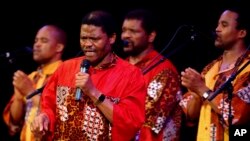Renowned South African choral and Zulu traditional music maestro Bhekizizwe Shabalala of Ladysmith Black Mambazo has died.
According to the South Africa Times, Shabalala died at a Pretoria Hospital today after a long illness.
The newspaper quoted his manager, Xolani Majozi, saying his family and group, which is currently on tour in the United States, have been devastated by his death.
In a tweet, Ladysmith Black Mambazo said, “Bhekizizwe Joseph Shabalala. Our Founder, our Teacher and most importantly, our Father left us today for eternal peace. We celebrate and honor your kind heart and your extraordinary life. Through your music and the millions who you came in contact with, you shall live forever.”
The South African government also paid tribute to the late Shabalala. In a tweet, it said, “We would like to extend our condolences on the passing of Joseph Shabalala who was the founder of the group Ladysmith Black Mambazo. Ulale ngoxolo Tata ugqatso lwakho ulufezile (rest in peace father, your race is complete."
Shabalala retired in 2014 after more than 50 years at the helm of the group that has won five Grammy awards. Ladysmith Black Mambazo featured in one of the most famous songs, Graceland, written and produced by American artist Paul Simon and Shabalala.
The group was formed in the 1960s after Shabalala and his friends were encouraged by friends at a farm in Kwazulu Natal near Ladysmith where they used to sing and dance a traditional Zulu dance, isichathamiya, to venture into music.
Shabalala, who was born in 1941 and was the eldest son in a family of eight, moved to Johannesburg in the 1970s where the group made its first music recordings after landing a contract with Gallo Records. They never looked back as they ventured into the world of music full time. They produced more than sixty albums.
In its official website, the groups says in addition to their work with Paul Simon, Ladysmith Black Mambazo has recorded with numerous artists from around the world, including Stevie Wonder, Dolly Parton, Sarah McLachlan, Josh Groban, Emmylou Harris, Melissa Etheridge and many many others.
Their singing voices can be heard in several films including Michael Jackson’s Moonwalker video and Spike Lee’s Do It A Cappella. They've provided soundtrack material for Disney’s The Lion King, Part II, Eddie Murphy’s Coming To America, Marlon Brando’s A Dry White Season, Sean Connery’s The League of Extraordinary Gentlemen, James Earl Jones’ Cry The Beloved Country and Clint Eaastwood's Invictus. A documentary film called On Tip Toe: Gentle Steps to Freedom, The Story Of Ladysmith Black Mambazo, was nominated for an Academy Award.
They have appeared on Broadway, have been nominated for Tony Awards and have won a Drama Desk Award.
“A favorite of the late great Nelson Mandela, Ladysmith Black Mambazo traveled with the South African president, at his request, when he went to Oslo, Norway to receive the Nobel Peace Prize. One year later they were singing at the inauguration of the newly elected President. After many more special appearances with the South African icon, Mandela proclaimed the group South Africa's Cultural Ambassadors to the World.”
Shabalala took the name Ladysmith from his hometown, which lies in the province of kwaZulu Natal, halfway between the city of Durban (where members of the group live today) and Johannesburg. The word Black being a reference to the oxen, the strongest of all farm animals, Joseph's way of honoring his early life on his family's farm. Mambazo is the Zulu word for chopping axe, a symbol of the group’s vocal strength, clearing the way for their music and eventual success.




